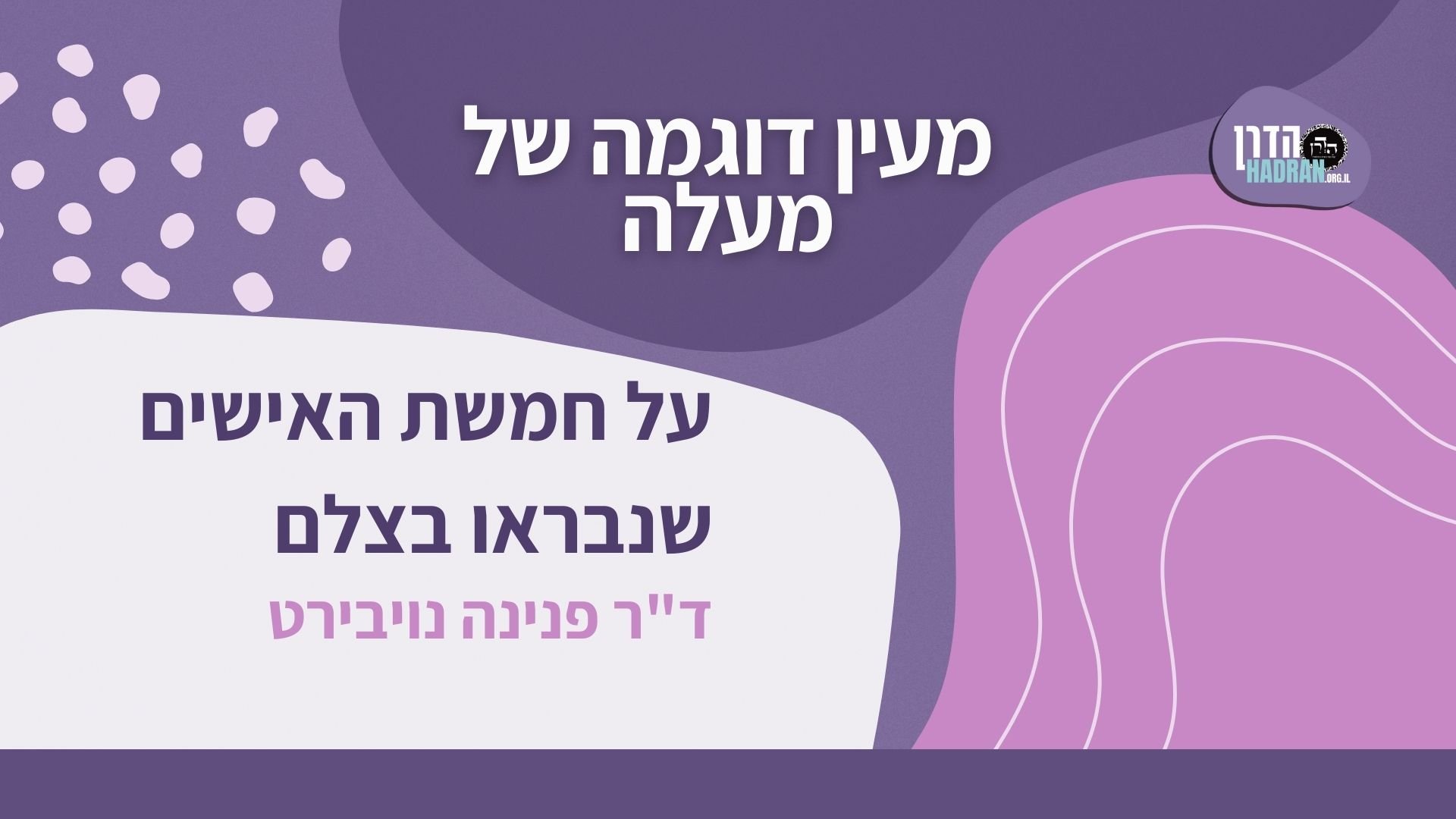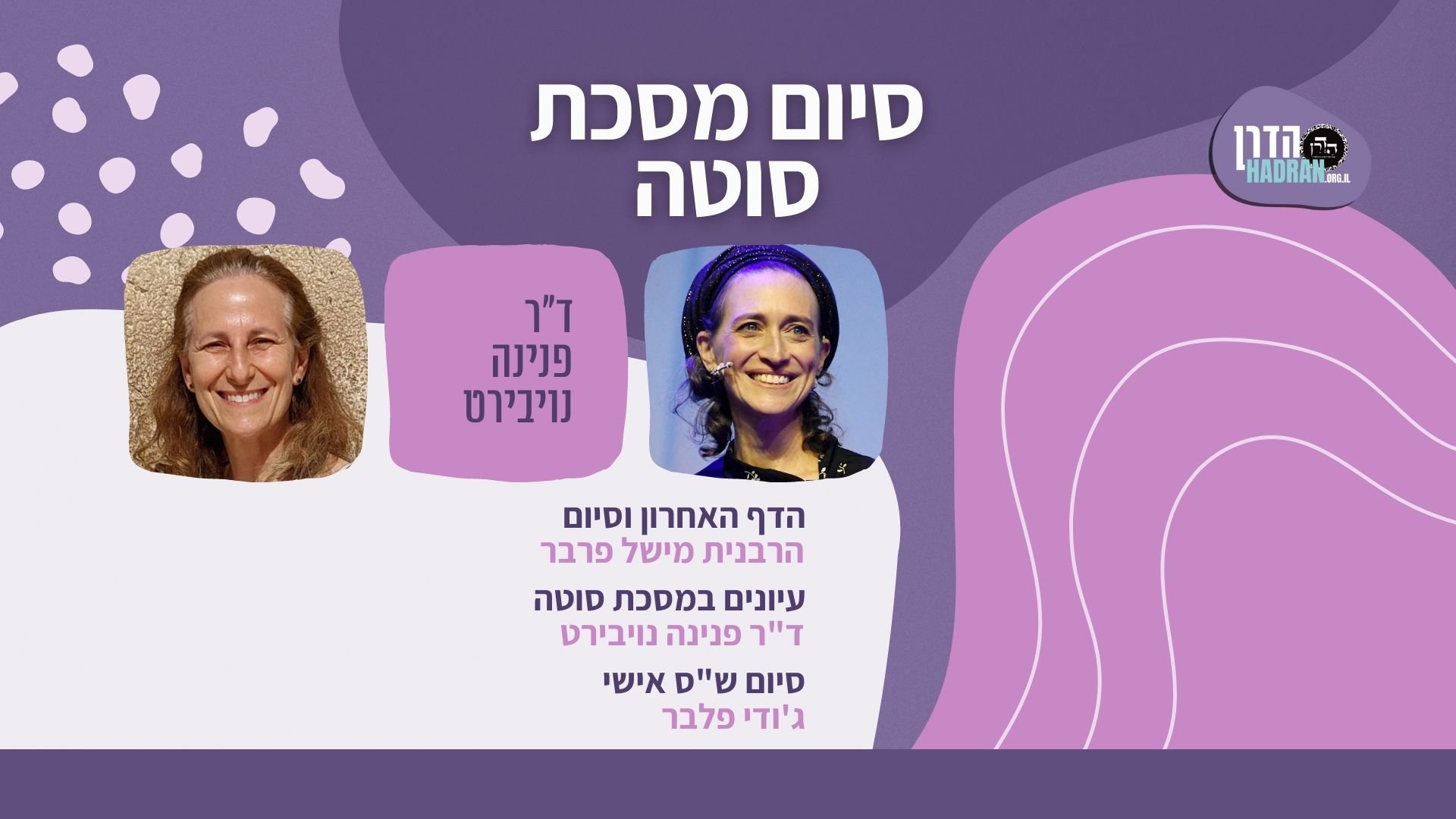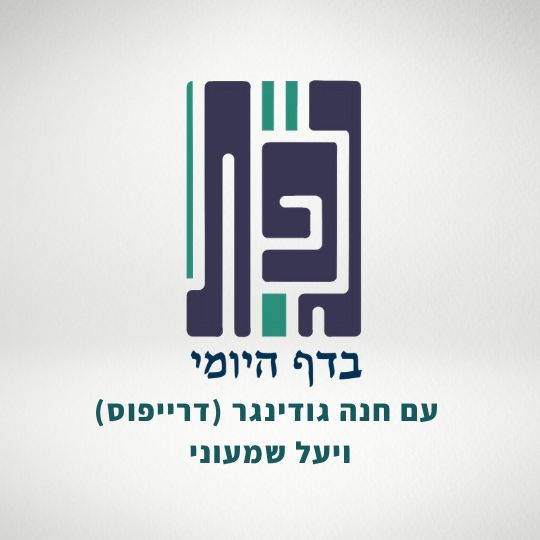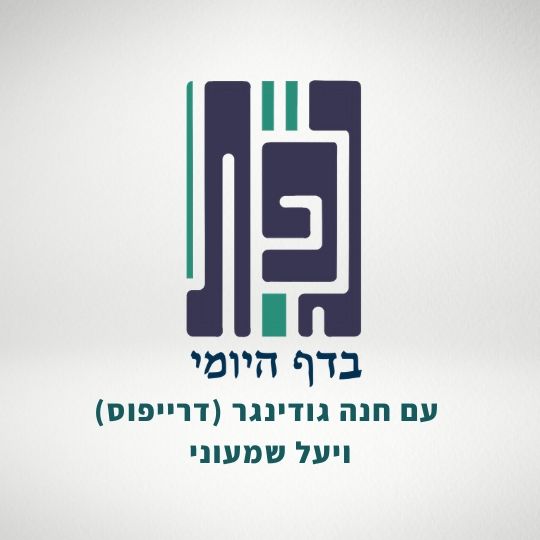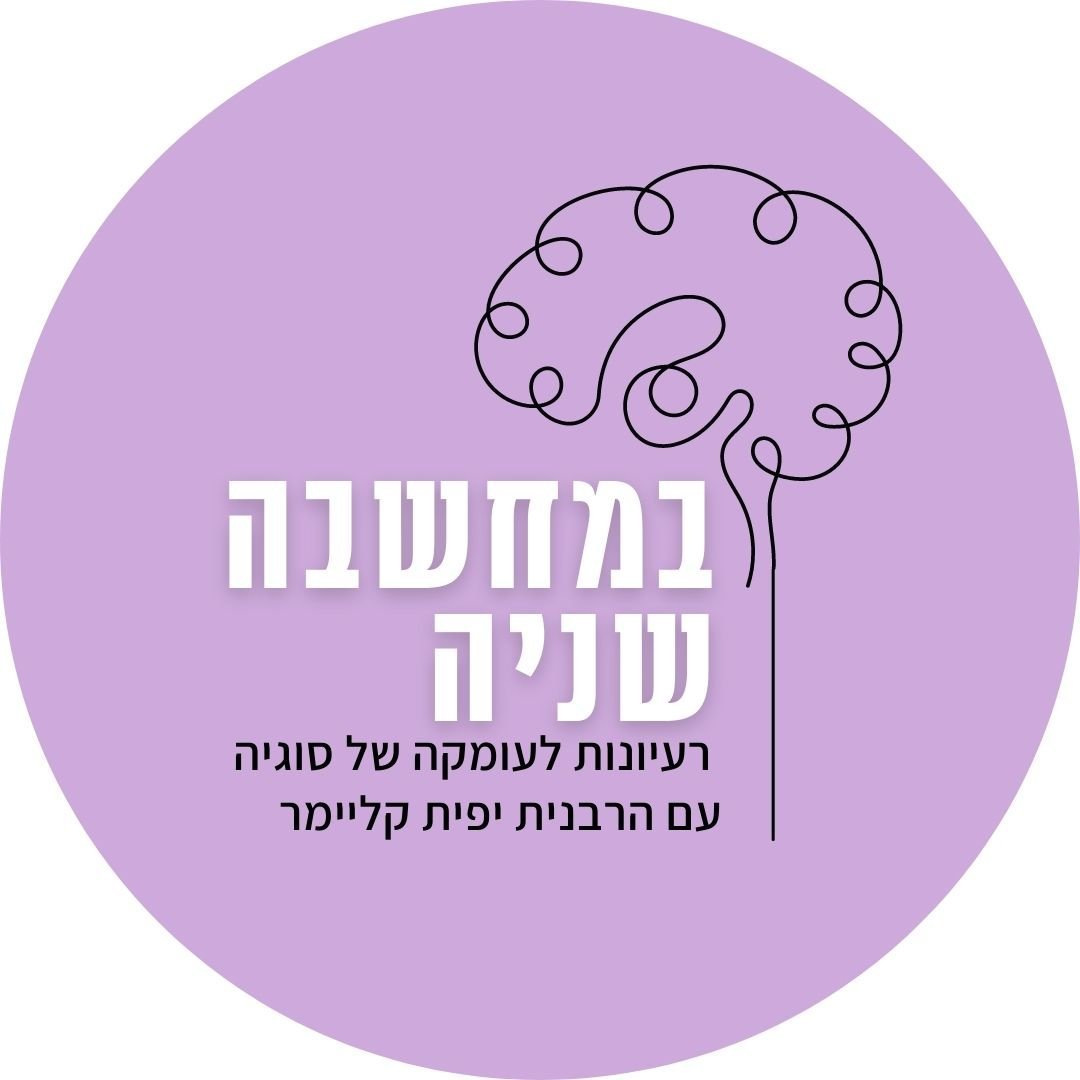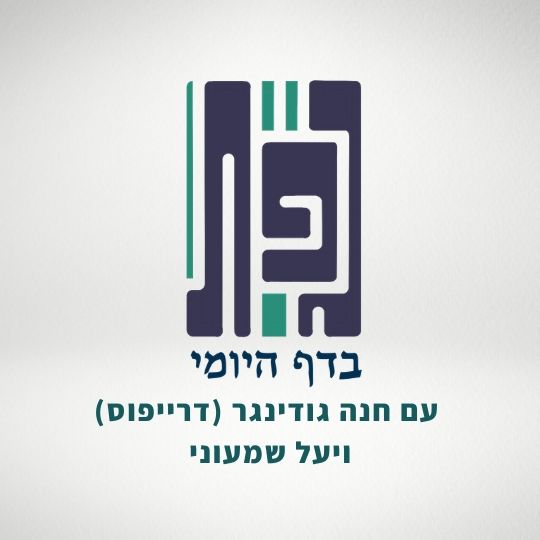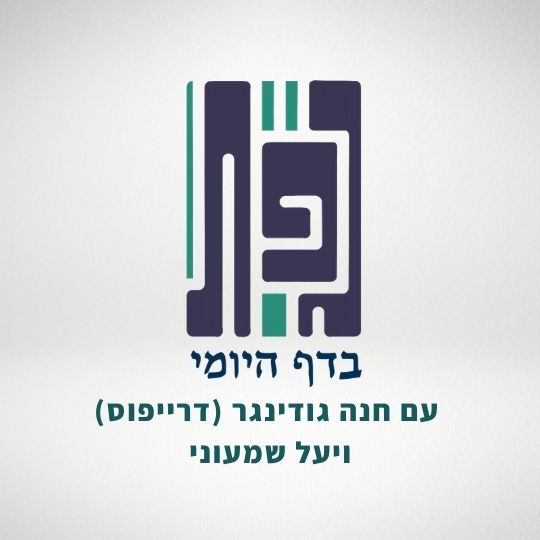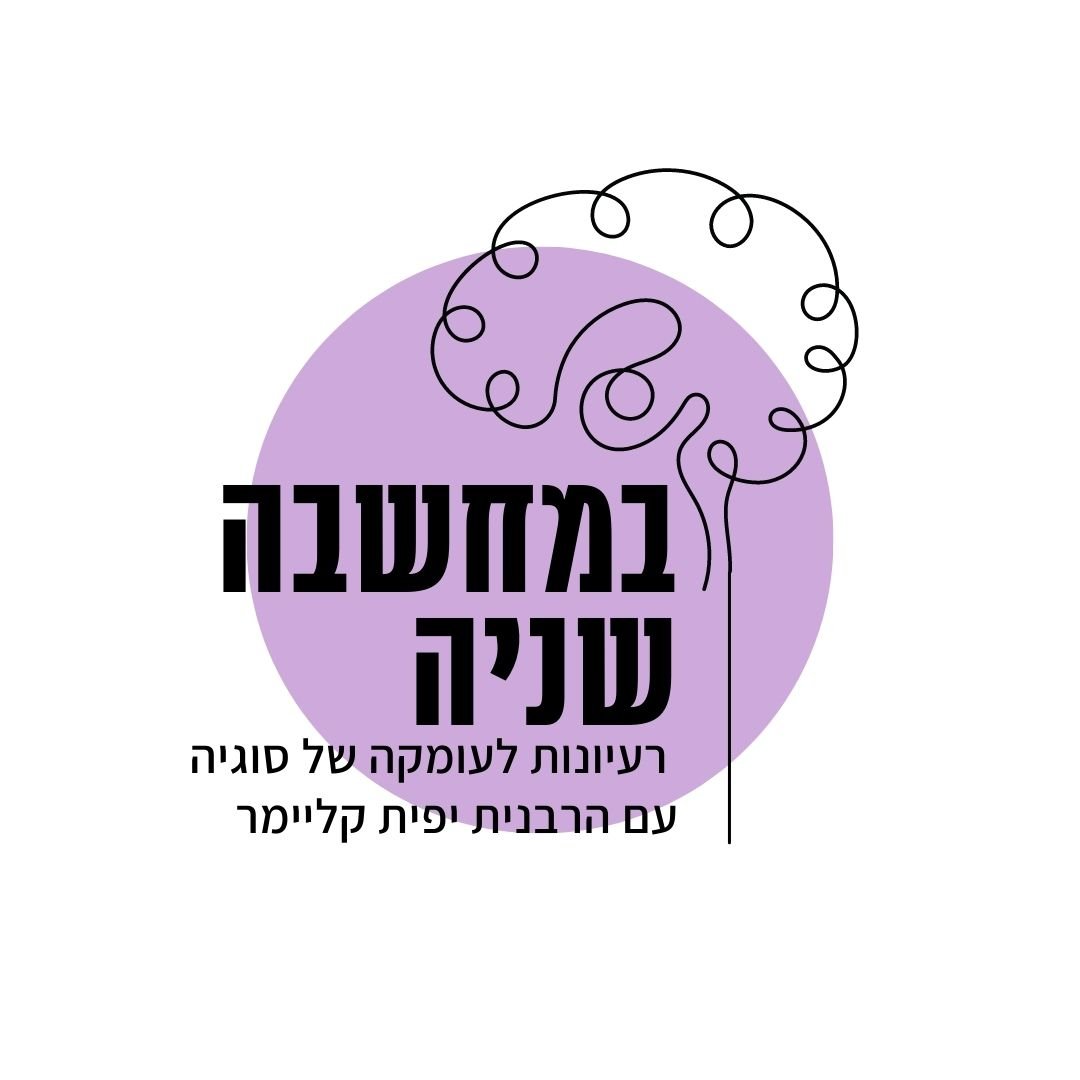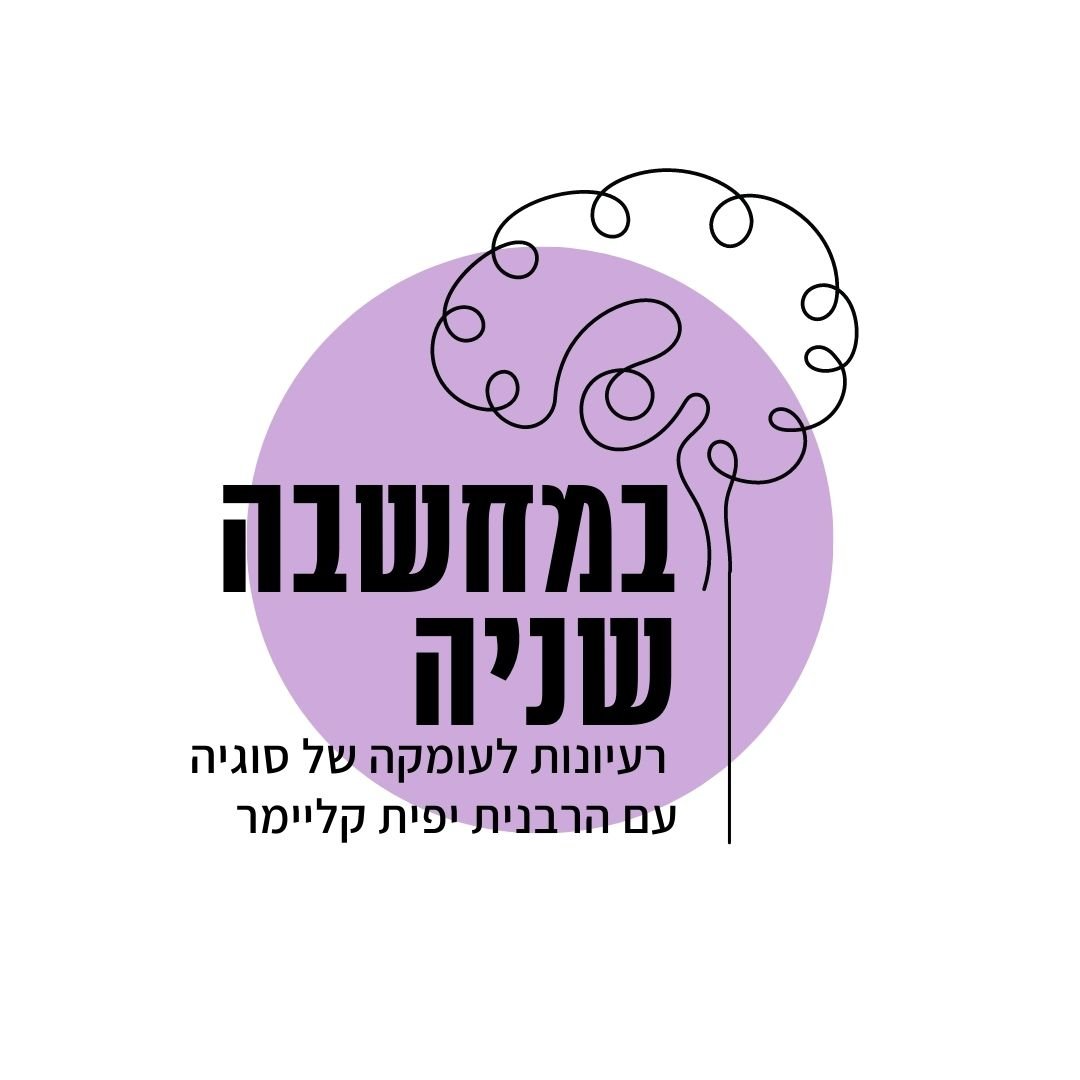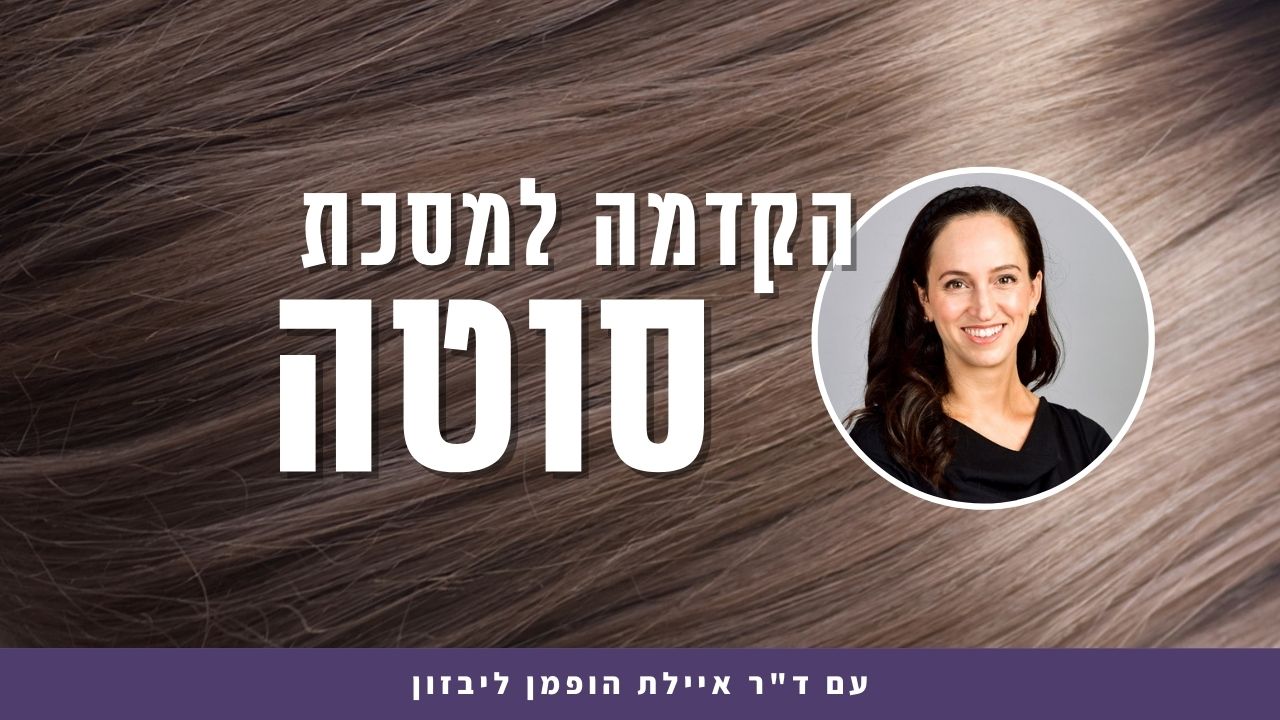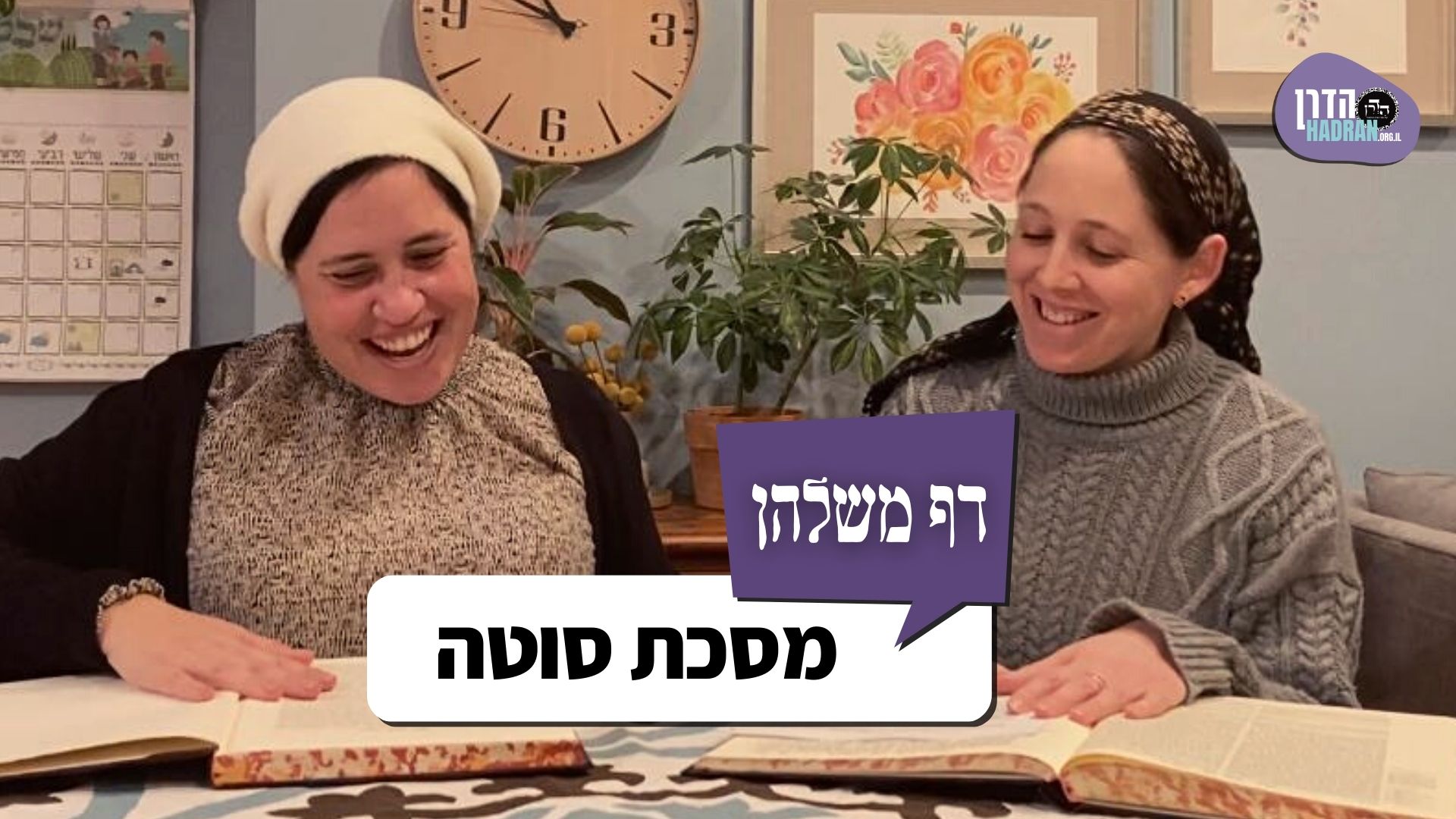סוטה מח
וַאֲנַן קָא יָהֲבִינַן לְכֹהֲנִים.
and we give it to the priests. Ezra penalized the Levites for not ascending with him from Babylonia to Eretz Yisrael by taking away their right to the first tithe. Consequently, the owner of the produce can no longer recite the declaration of tithes, which includes the statement: “I have done according to all that You have commanded me” (Deuteronomy 26:14), as he did not give the tithe to the Levites.
וְלוֹדֵי אַשְּׁאָר מַעַשְׂרוֹת? אָמַר רֵישׁ לָקִישׁ: כׇּל בַּיִת שֶׁאֵין מִתְוַדֶּה עַל מַעֲשֵׂר רִאשׁוֹן — שׁוּב אֵין מִתְוַדֶּה עַל שְׁאָר מַעַשְׂרוֹת. מַאי טַעְמָא? אָמַר אַבָּיֵי: הוֹאִיל וּפָתַח בּוֹ הַכָּתוּב תְּחִילָּה.
The Gemara asks: And let him at least declare that he donated the other tithes in the proper manner. Reish Lakish said: Any house that does not state the declaration about the first tithe can no longer state the declaration of the other types of tithes. The Gemara asks: What is the reason for this? Abaye said: Because the written verse began the declaration with the tithe given to the Levites: “And I also gave it to the Levite, and to the stranger, to the orphan, and to the widow, in accordance with all Your mitzvot that You commanded me” (Deuteronomy 26:13). If he cannot say the first part of the declaration, he cannot say the rest.
מִכְלָל דְּאַפְרוֹשֵׁי הֲווֹ מַפְרְשִׁי? וְהָא תַּנְיָא: אַף הוּא בִּיטֵּל אֶת הַוִּידּוּי, וְגָזַר עַל הַדְּמַאי. לְפִי שֶׁשָּׁלַח בְּכׇל גְּבוּל יִשְׂרָאֵל וְרָאָה שֶׁאֵין מַפְרִישִׁין אֶלָּא תְּרוּמָה גְּדוֹלָה בִּלְבַד, וּמַעֲשֵׂר רִאשׁוֹן וּמַעֲשֵׂר שֵׁנִי — מִקְצָתָן מְעַשְּׂרִין וּמִקְצָתָן אֵין מְעַשְּׂרִין.
The Gemara poses a question: The fact that Rabbi Yoḥanan canceled the declaration of tithes proves by inference that they would separate tithes in his days. But isn’t it taught (Tosefta 13:10): He, Yoḥanan the High Priest, also canceled the declaration of tithes and decreed with regard to doubtfully tithed produce [demai]? Why did he issue this decree? Because he sent messengers throughout the land, to all the borders of Eretz Yisrael to investigate, and saw that they would separate only teruma gedola, and as for first tithe and second tithe, some people would tithe and some people would not tithe.
אָמַר לָהֶם: בָּנַי, בּוֹאוּ וְאוֹמַר לָכֶם: כְּשֵׁם שֶׁתְּרוּמָה גְּדוֹלָה יֵשׁ בָּהּ עֲוֹן מִיתָה — כָּךְ תְּרוּמַת מַעֲשֵׂר וְטֶבֶל יֵשׁ בָּהֶן עֲוֹן מִיתָה.
He said to them: My sons, come and I will tell you something: Just as the halakhot of teruma gedola include a transgression punishable by death at the hand of God, as one who ate produce from which teruma has not been separated is punished with death from Heaven, so too, the teruma of the tithe, the portion the Levites must separate from their first tithe and give to priests, and untithed produce, these include a transgression punishable by death at the hand of God, if the produce is eaten without the tithes having been taken.
עָמַד וְהִתְקִין לָהֶם: הַלּוֹקֵחַ פֵּירוֹת מֵעַם הָאָרֶץ — מַפְרִישׁ מֵהֶן מַעֲשֵׂר רִאשׁוֹן וּמַעֲשֵׂר שֵׁנִי. מַעֲשֵׂר רִאשׁוֹן — מַפְרִישׁ מִמֶּנָּה תְּרוּמַת מַעֲשֵׂר וְנוֹתְנָהּ לְכֹהֵן, וּמַעֲשֵׂר שֵׁנִי עוֹלֶה וְאוֹכְלוֹ בִּירוּשָׁלַיִם. מַעֲשֵׂר רִאשׁוֹן וּמַעְשַׂר עָנִי — הַמּוֹצִיא מֵחֲבֵירוֹ עָלָיו הָרְאָיָה!
Realizing that it was uncertain with regard to whether or not people were separating tithes, he arose and instituted an ordinance for them with regard to doubtfully tithed produce: One who purchases produce from an am ha’aretz, which may or may not have been tithed, must separate from the produce first tithe and second tithe due to the uncertainty as to whether or not the am ha’aretz separated them. As for first tithe, he then separates teruma of the tithe from it and gives it to a priest, and with regard to second tithe, he goes up and eats it in Jerusalem. However, with regard to the giving of first tithe to the Levite, and the poor man’s tithe, which can be eaten by anyone, as the Levites and the poor only have monetary rights to the produce, the burden of proof rests upon the claimant. Since the Levites and the poor cannot prove that these tithes had not already been set aside by the am ha’aretz, they cannot force the buyer to give them those tithes.
תַּרְתֵּי תַּקֵּן: בִּיטֵּל וִידּוּי דַּחֲבֵירִים, וְגָזַר עַל דְּמַאי שֶׁל עַמֵּי הָאָרֶץ.
In any case, the Gemara proves from the baraita that not all people would separate tithes in the time of Yoḥanan the High Priest. The Gemara answers: He instituted two ordinances: He canceled the declaration of tithes of those devoted to the meticulous observance of mitzvot [ḥaverim], especially halakhot of teruma and tithes, and he decreed with regard to doubtfully tithed produce purchased from amei ha’aretz, because they may not have separated tithes at all.
וְאַף הוּא בִּיטֵּל אֶת הַמְעוֹרְרִים. מַאי מְעוֹרְרִים? אָמַר רַחֲבָה: בְּכׇל יוֹם וָיוֹם שֶׁהָיוּ עוֹמְדִים לְוִיִּם עַל דּוּכָן וְאוֹמְרִים ״עוּרָה לָמָּה תִישַׁן ה׳״, אָמַר לָהֶן: וְכִי יֵשׁ שֵׁינָה לִפְנֵי הַמָּקוֹם? וַהֲלֹא כְּבָר נֶאֱמַר ״הִנֵּה לֹא יָנוּם וְלֹא יִישָׁן שׁוֹמֵר יִשְׂרָאֵל״! אֶלָּא בִּזְמַן שֶׁיִּשְׂרָאֵל שְׁרוּיִין בְּצַעַר וְאוּמּוֹת הָעוֹלָם בְּנַחַת וְשַׁלְוָה, לְכָךְ נֶאֱמַר ״עוּרָה לָמָּה תִישַׁן ה׳״.
§ The mishna further taught: He also nullified the actions of the awakeners. The Gemara poses a question: What are awakeners? Raḥava says: On each and every day when the Levites stood on the platform in the Temple they would say: “Awake, why do you sleep, O Lord?” (Psalms 44:24). Therefore, they were called awakeners. Yoḥanan the High Priest said to them: Does the Omnipresent sleep, that you call upon Him to awaken? But isn’t it already stated: “Behold, He that keeps Israel neither slumbers nor sleeps” (Psalms 121:4)? Rather, when the Jewish people are in a state of suffering, and the nations of the world are in a state of calm and serenity, it is with regard to this that it is stated: “Awake, why do you sleep, O Lord?” If the verse were to be recited every morning it would be interpreted in the wrong way, so Yoḥanan the High Priest therefore canceled the daily recitation of this verse.
וְאֶת הַנּוֹקְפִים. מַאי ״נוֹקְפִים״? אָמַר רַב יְהוּדָה אָמַר שְׁמוּאֵל: שֶׁהָיוּ מְסָרְטִין לָעֵגֶל בֵּין קַרְנָיו, כְּדֵי שֶׁיִּפּוֹל דָּם בְּעֵינָיו. אֲתָא אִיהוּ בַּטֵּיל, מִשּׁוּם דְּמִיחֲזֵי כִּי מוּמָא.
The mishna also taught that Yoḥanan the High Priest canceled the strikers. The Gemara asks: What are strikers? Rav Yehuda says that Shmuel says: They are those who would scratch the calf being prepared for slaughter as an offering between its horns, in order that blood should fall in its eyes, so that the animal would not see and resist being slaughtered. He came and nullified this practice, because it looked like they are causing a blemish.
בְּמַתְנִיתָא תָּנָא: שֶׁהָיוּ חוֹבְטִין אוֹתוֹ בְּמַקְלוֹת כְּדֶרֶךְ שֶׁעוֹשִׂין אוֹתוֹ לִפְנֵי עֲבוֹדָה זָרָה. אָמַר לָהֶם: עַד מָתַי אַתֶּם מַאֲכִילִין נְבֵילוֹת לַמִּזְבֵּחַ! נְבֵילוֹת?! הָא שָׁחֵיט לְהוּ! אֶלָּא טְרֵיפוֹת — שֶׁמָּא נִיקַּב קְרוּם שֶׁל מוֹחַ. עָמַד וְהִתְקִין לָהֶם טַבָּעוֹת בַּקַּרְקַע.
A different explanation of strikers was taught in a baraita (Tosefta 13:9): They are those who would beat the calf with sticks, to stun it before it was slaughtered, in the manner that they do it before idols. Yoḥanan the High Priest said to them: Until when will you feed unslaughtered animal carcasses to the altar? The Gemara asks: Are these animal carcasses actually unslaughtered animal carcasses? They were slaughtered, i.e., they did not die of their own accord. Rather, he said that the beatings would cause them to become like animals with a wound that will cause them to die within twelve months [tereifot], as perhaps these beatings will perforate the membrane surrounding the brain, which would make the calf a tereifa. He therefore arose and instituted an ordinance for them to put rings in the ground with which they could secure the animals, thereby making it easier to slaughter the animals without having to scratch them between the horns or hit them with sticks.
עַד יָמָיו הָיָה פַּטִּישׁ מַכֶּה בִּירוּשָׁלַיִם. בְּחוּלּוֹ שֶׁל מוֹעֵד.
The mishna stated that until the days of Yoḥanan the High Priest the hammer of smiths would strike in Jerusalem. The Gemara explains: This is referring to the intermediate days of a Festival. Though certain types of labor are permitted on those days, the banging of a hammer was outlawed, as the noise it made would detract from the feeling of sanctity of the day.
כׇּל יָמָיו לֹא הָיָה אָדָם צָרִיךְ לִשְׁאוֹל עַל הַדְּמַאי. כְּדַאֲמַרַן.
They further taught that in all of his days a person did not need to inquire with regard to doubtfully tithed produce. The Gemara notes that this is like that which we stated above, that he instituted an ordinance with regard to the tithing of doubtfully tithed produce.
מַתְנִי׳ מִשֶּׁבָּטְלָה סַנְהֶדְרִין — בָּטַל הַשִּׁיר מִבֵּית הַמִּשְׁתָּאוֹת, שֶׁנֶּאֱמַר: ״בַּשִּׁיר לֹא יִשְׁתּוּ יָיִן וְגוֹ׳״.
MISHNA: This mishna continues with the list of items that were nullified. From the time when the Sanhedrin ceased song was also nullified from the places of feasts, i.e., it was no longer permitted to sing at a feast where wine was served, as it is stated: “With song they shall not drink wine” (Isaiah 24:9).
מִשֶּׁמֵּתוּ נְבִיאִים הָרִאשׁוֹנִים — בָּטְלוּ אוּרִים וְתוּמִּים. מִשֶּׁחָרַב בֵּית הַמִּקְדָּשׁ — בָּטַל הַשָּׁמִיר וְנוֹפֶת צוּפִים, וּפָסְקוּ אַנְשֵׁי אֲמָנָה מִיִּשְׂרָאֵל, שֶׁנֶּאֱמַר: ״הוֹשִׁיעָה ה׳ כִּי גָמַר חָסִיד וְגוֹ׳״.
From the time when the early prophets died the Urim VeTummim was nullified. From the time when the Second Temple was destroyed the shamir worm ceased to exist and also the sweetness of the honeycomb, as the verse says with regard to the laws of the Torah: “More to be desired are they than gold, indeed, than much fine gold; sweeter also than honey and the honeycomb” (Psalms 19:11). And men of faith ceased from being among the Jewish people, as it is stated: “Help, Lord, for the pious man is finished; for the faithful fail from among the children of men” (Psalms 12:2).
רַבָּן שִׁמְעוֹן בֶּן גַּמְלִיאֵל אוֹמֵר, הֵעִיד רַבִּי יְהוֹשֻׁעַ: מִיּוֹם שֶׁחָרַב בֵּית הַמִּקְדָּשׁ אֵין יוֹם שֶׁאֵין בּוֹ קְלָלָה, וְלֹא יָרַד הַטַּל לִבְרָכָה, וְנִיטַּל טַעַם הַפֵּירוֹת. רַבִּי יוֹסֵי אוֹמֵר: אַף נִיטַּל שׁוֹמֶן הַפֵּירוֹת. רַבִּי שִׁמְעוֹן בֶּן אֶלְעָזָר אוֹמֵר: הַטׇּהֳרָה נָטְלָה אֶת הַטַּעַם וְאֶת הָרֵיחַ, הַמַּעַשְׂרוֹת נָטְלוּ אֶת שׁוֹמֶן הַדָּגָן. וַחֲכָמִים אוֹמְרִים: הַזְּנוּת וְהַכְּשָׁפִים כִּילוּ אֶת הַכֹּל.
Rabban Shimon ben Gamliel says that Rabbi Yehoshua testified: From the day the Temple was destroyed there is no day that does not include some form of curse. And since then the dew has not descended for blessing, and the taste has been removed from fruit. Rabbi Yosei says: Since then, the fat of fruit has also been removed. Rabbi Shimon ben Elazar says: Since then, the lost purity has removed the taste and the aroma from fruit; the tithes that were not separated have removed the fat of the grain. And the Sages say: Promiscuity and witchcraft have consumed it all.
גְּמָ׳ וּמִמַּאי דְּמִשֶּׁבָּטְלָה סַנְהֶדְרִי כְּתִיב? אָמַר רַב הוּנָא בְּרֵיהּ דְּרַב יְהוֹשֻׁעַ, דְּאָמַר קְרָא: ״זְקֵנִים מִשַּׁעַר שָׁבָתוּ בַּחוּרִים מִנְּגִינָתָם״.
GEMARA: The Gemara poses a question with regard to the first clause of the mishna: And from where is it derived that the verse: “With song they shall not drink wine” (Isaiah 24:9) is written about the period from the time when the Sanhedrin was nullified? Rav Huna, son of Rav Yehoshua, said: From that which the verse states: “The Elders have ceased from the gate, the young men from their music” (Lamentations 5:14). This indicates that the dissolution of the Sanhedrin, who are the Elders from the gate, is linked to the end of the young men singing.
אָמַר רַב: אוּדְנָא דְּשָׁמְעָא זִמְרָא — תִּעֲקַר. אָמַר רָבָא: זִמְרָא בְּבֵיתָא — חוּרְבָּא בְּסִיפָּא, שֶׁנֶּאֱמַר: ״קוֹל יְשׁוֹרֵר בַּחַלּוֹן חֹרֶב בַּסַּף כִּי אַרְזָה עֵרָה״.
Rav said: The ear that hears song should be uprooted, as it is prohibited to listen to music after the destruction of the Temple. Rava said: If there is song in a house there will be destruction on the threshold, as it is stated: “Voices shall sing in the windows; desolation shall be in the doorposts; for its cedar work shall be uncovered” (Zephaniah 2:14). The word “uncovered” [era] could be read to mean: Its city [ira].
מַאי ״כִּי אַרְזָה עֵרָה״? אָמַר רַבִּי יִצְחָק: בַּיִת הַמְסוּבָּךְ בַּאֲרָזִים עִיר הוּא! אֶלָּא: אֲפִילּוּ בַּיִת הַמְסוּבָּךְ בַּאֲרָזִים מִתְרוֹעֵעַ. אָמַר רַב אָשֵׁי: שְׁמַע מִינַּהּ כִּי מַתְחֵיל חוּרְבָּא — בְּסִיפָּא מַתְחֵיל, שֶׁנֶּאֱמַר: ״חֹרֶב בַּסַּף״. וְאִיבָּעֵית אֵימָא מֵהָכָא: ״וּשְׁאִיָּה יֻכַּת שָׁעַר״. אָמַר מָר בַּר רַב אָשֵׁי: לְדִידִי חֲזֵי לִי וּמְנַגַּח כִּי תוֹרָא.
The Gemara asks: What is the meaning of: For its cedar work shall be its city? Furthermore, Rabbi Yitzḥak wondered when he said: Is a house interlaced with cedars not as strong as a city, and therefore not threatened by desolation? Rather, it means that even a house interlaced with cedars will become unstable [mitroe’a] if song is heard there. Rav Ashi said: Learn from it that when the destruction starts it starts with the threshold, as it is stated: “Desolation shall be in the posts.” And if you wish, say instead that they derive this idea from here: “In the city is left desolation, and the gate is smitten unto ruin [she’iyya]” (Isaiah 24:12). The term “ruin” here is referring to the destructive demon known as She’iyya, who strikes the gate first. Mar bar Rav Ashi said: I saw it, this She’iyya, and it was goring and wreaking havoc like an ox.
אָמַר רַב הוּנָא: זִמְרָא דְּנַגָּדֵי וּדְבַקָּרֵי — שְׁרֵי. דְּגַרְדָּאֵי — אֲסִיר. רַב הוּנָא בַּטֵּיל זִמְרָא, קָם מְאָה אֲווֹזֵי בְּזוּזָא וּמְאָה סָאֵה חִיטֵּי בְּזוּזָא וְלָא אִיבְּעִי. אֲתָא רַב חִסְדָּא זַלְזֵיל בֵּיהּ, אִיבְּעַאי אֲווֹזָא בְּזוּזָא וְלָא אִשְׁתְּכַח.
Rav Huna said: The song of those who pull ships and lead the herd is permitted, for their singing assists them to establish a rhythm in their work. However, that of weavers is forbidden, as they sing only for their own enjoyment. The Gemara relates that subsequently, Rav Huna nullified all types of song, and this led to a general blessing: The price of one hundred ducks stood at a dinar, and one hundred se’a of wheat at a dinar, and there was no desire for them even at such a cheap price, due to their great abundance. Later, when Rav Ḥisda came and belittled this prohibition, people began to sing again. As a result, prices increased greatly, and this led to a situation whereby one wanted a single duck for one dinar and it could not be found.
אָמַר רַב יוֹסֵף: זָמְרִי גַּבְרֵי וְעׇנְיָ[ין] נְשֵׁי — פְּרִיצוּתָא. (זָמְרִי) [זָמְרָן] נְשֵׁי וְעָנַיִ[ין] גַּבְרֵי — כְּאֵשׁ בִּנְעוֹרֶת. לְמַאי נָפְקָא מִינַּהּ — לְבַטּוֹלֵי הָא מִקַּמֵּי הָא.
Rav Yosef said: If men sing and women respond, this is licentiousness. If women sing and men respond, it causes the evil inclination to burn as if one were setting fire to chips of kindling. The Gemara poses a question: What difference is there? Rav Yosef indicates that in any case both are prohibited. The Gemara answers: To nullify one before the other, i.e., if it is impossible to ban singing entirely, they should at least stop the most problematic form.
אָמַר רַבִּי יוֹחָנָן: כׇּל הַשּׁוֹתֶה בְּאַרְבָּעָה מִינֵי זֶמֶר, מֵבִיא חָמֵשׁ פּוּרְעָנִיּוֹת לְעוֹלָם, שֶׁנֶּאֱמַר: ״הוֹי מַשְׁכִּימֵי בַבֹּקֶר שֵׁכָר יִרְדֹּפוּ מְאַחֲרֵי בַנֶּשֶׁף יַיִן יַדְלִיקֵם וְהָיָה כִנּוֹר וָנֶבֶל תֹּף וְחָלִיל וָיַיִן מִשְׁתֵּיהֶם וְאֵת פֹּעַל ה׳ לֹא יַבִּיטוּ״,
Rabbi Yoḥanan says: Anyone who drinks wine with the accompaniment of four types of instruments brings five types of retribution to the world, as it is stated: “Woe to them who rise early in the morning, that they may follow strong drink; who tarry late into the night, until wine inflames them. And the harp and the psaltery, the drum and the pipe and wine, are at their feasts, but they do not regard the work of the Lord” (Isaiah 5:11–12).
מָה כְּתִיב אַחֲרָיו: ״לָכֵן גָּלָה עַמִּי מִבְּלִי דָעַת״ — שֶׁגּוֹרְמִין גָּלוּת לָעוֹלָם, ״וּכְבוֹדוֹ מֵתֵי רָעָב״ — שֶׁמְּבִיאִין רָעָב לְעוֹלָם, ״וַהֲמוֹנוֹ צִחֵה צָמָא״ — שֶׁגּוֹרְמִין לַתּוֹרָה שֶׁתִּשְׁתַּכַּח מִלּוֹמְדֶיהָ, ״וַיִּשַּׁח אָדָם וַיִּשְׁפַּל אִישׁ״ — שֶׁגּוֹרְמִין שִׁפְלוּת לְשׂוֹנְאוֹ שֶׁל הַקָּדוֹשׁ בָּרוּךְ הוּא. וְאֵין ״אִישׁ״ אֶלָּא הַקָּדוֹשׁ בָּרוּךְ הוּא, שֶׁנֶּאֱמַר: ״ה׳ אִישׁ מִלְחָמָה״, ״וְעֵינֵי גְבֹהִים תִּשְׁפַּלְנָה״ — שֶׁגּוֹרְמִין שִׁפְלוּת שֶׁל יִשְׂרָאֵל.
After listing the sin of those who drink wine with musical accompaniment, the verse states their punishment: What is written afterward? “Therefore, My people have gone into captivity, for want of knowledge” (Isaiah 5:13), meaning that they cause exile to the world; “and their honorable men are famished” (Isaiah 5:13), as they bring famine to the world; “and their multitude are parched with thirst” (Isaiah 5:13), that they cause the Torah, which is compared to water, to be forgotten by those who learn it. “And mankind is bowed down, and man is humbled” (Isaiah 5:15), that they cause the enemy of the Holy One, Blessed be He, i.e., God Himself, to be brought down, as “man” in the phrase “and man is humbled” means nothing other than the Holy One, Blessed be He, as it is stated: “The Lord is a man of war” (Exodus 15:3). The verse continues: “And the eyes of the lofty are humbled” (Isaiah 5:15), that they cause the Jewish people to be brought down. These are the five retributions.
וּמָה כְּתִיב אַחֲרָיו — ״לָכֵן
And what punishment is written afterward for the people who drank wine with musical accompaniment? “Therefore,
הִרְחִיבָה שְּׁאוֹל נַפְשָׁהּ וּפָעֲרָה פִיהָ לִבְלִי חֹק וְיָרַד הֲדָרָהּ וַהֲמוֹנָהּ וּשְׁאוֹנָהּ וְעָלֵז בָּהּ״.
the netherworld has enlarged her desire, and opened her mouth without measure, and down goes their glory and their tumult and their uproar, and he who rejoices among them” (Isaiah 5:14). Their punishment is that they shall descend into the netherworld.
מִשֶּׁמֵּתוּ נְבִיאִים הָרִאשׁוֹנִים. מַאן ״נְבִיאִים הָרִאשׁוֹנִים״? אָמַר רַב הוּנָא: זֶה דָּוִד וּשְׁמוּאֵל וּשְׁלֹמֹה. רַב נַחְמָן אָמַר: בִּימֵי דָּוִד, זִימְנִין סְלֵיק, וְזִימְנִין לָא סְלֵיק, שֶׁהֲרֵי שָׁאַל צָדוֹק — וְעָלְתָה לוֹ, שָׁאַל אֶבְיָתָר — וְלֹא עָלְתָה לוֹ, שֶׁנֶּאֱמַר: ״וַיַּעַל אֶבְיָתָר״.
§ The mishna taught: From the time when the early prophets died, the Urim VeTummim was nullified. The Gemara poses a question: Who are the early prophets? Rav Huna says: This is referring to David, and Samuel, and Solomon, and after their death the Urim VeTummim was no longer used. Rav Naḥman said: In the days of David there were times an answer rose up for them from the Urim VeTummim and there were times an answer did not rise up, i.e., they did not receive an answer. The proof for this is that Tzadok, the High Priest in David’s time, asked the Urim VeTummim and an answer rose up for him, whereas Abiathar asked and an answer did not rise up for him, as it is stated: “And Abiathar went up” (II Samuel 15:24), and he was removed from serving as the High Priest as a result.
מֵתִיב רַבָּה בַּר שְׁמוּאֵל: ״וַיְהִי לִדְרֹשׁ אֱלֹהִים בִּימֵי זְכַרְיָהוּ הַמֵּבִין בִּרְאֹת הָאֱלֹהִים״, מַאי לָאו, בְּאוּרִים וְתוּמִּים? לֹא, בִּנְבִיאִים.
Rabba bar Shmuel raises an objection: The verse states concerning Uzziah: “And he set himself to seek God in the days of Zechariah, who had an understanding of the vision of God” (II Chronicles 26:5). What, is the verse not stating that Uzziah would seek God by asking questions of the Urim VeTummim, despite the fact that he lived after the time of Solomon? The Gemara rejects this claim: No, he would seek God by asking questions of the prophets, but not of the Urim VeTummim.
תָּא שְׁמַע: מִשֶּׁחָרַב בֵּית הַמִּקְדָּשׁ רִאשׁוֹן בָּטְלוּ עָרֵי מִגְרָשׁ, וּפָסְקוּ אוּרִים וְתוּמִּים, וּפָסַק מֶלֶךְ מִבֵּית דָּוִד.
The Gemara suggests: Come and hear a proof from a baraita (Tosefta 13:2) with regard to when the Urim VeTummim ceased: From the time when the First Temple was destroyed, the cities with fields that were allocated to the Levites were nullified, and the Urim VeTummim ceased, and the monarchy ceased from the house of David.
וְאִם לְחָשְׁךָ אָדָם לוֹמַר: ״וַיֹּאמֶר הַתִּרְשָׁתָא לָהֶם אֲשֶׁר לֹא יֹאכְלוּ מִקֹּדֶשׁ הַקֳּדָשִׁים עַד עֲמֹד כֹּהֵן לְאוּרִים וּלְתֻמִּים״, אֱמוֹר לוֹ: כְּאָדָם שֶׁאוֹמֵר לַחֲבֵירוֹ ״עַד שֶׁיִּחְיוּ מֵתִים וְיָבֹא מָשִׁיחַ בֶּן דָּוִד״.
And if a person would whisper to you saying that the Urim VeTummim was still extant, as it states with regard to when the Second Temple first stood: “And the Tirshatha said to them that they should not eat of the most sacred things, until there stood a priest with the Urim VeTummim” (Ezra 2:63), which seems to indicate that they merely had to wait until the Second Temple was built for the reappearance of the Urim VeTummim; you should say to him that this is not referring to an expectation of a short-term development, but it is like a person who says to his friend, with regard to something that will occur in the distant future: Until the dead live and the Messiah, the son of David, comes. In any case, the baraita indicates that the Urim VeTummim ceased only from the time when the First Temple was destroyed, and not in the time of Solomon.
אֶלָּא אָמַר רַב נַחְמָן בַּר יִצְחָק: מַאן ״נְבִיאִים הָרִאשׁוֹנִים״ — לְאַפּוֹקֵי מֵחַגַּי זְכַרְיָה וּמַלְאָכִי, דְּאַחֲרוֹנִים נִינְהוּ. דְּתָנוּ רַבָּנַן: מִשֶּׁמֵּתוּ חַגַּי זְכַרְיָה וּמַלְאָכִי — נִסְתַּלְּקָה רוּחַ הַקּוֹדֶשׁ מִיִּשְׂרָאֵל. וְאַף עַל פִּי כֵן, הָיוּ מִשְׁתַּמְּשִׁים בְּבַת קוֹל,
Rather, Rav Naḥman bar Yitzḥak said: Who are the early prophets, with regard to whom it states that use of the Urim VeTummim ceased immediately after their death? This term early prophets serves to exclude Haggai, Zechariah, and Malachi, who are the latter prophets. The Urim VeTummim was used throughout the First Temple period, up to, but not including, their time. As the Sages taught in a baraita (Tosefta 13:3): From the time when Haggai, Zechariah, and Malachi died the Divine Spirit departed from the Jewish people, as these three were considered to be the last prophets. And even after the Urim VeTummim ceased to exist, they would nevertheless still make use of a Divine Voice to receive instructions from Above, even after this time.
שֶׁפַּעַם אַחַת הָיוּ מְסוּבִּין בַּעֲלִיַּית בֵּית גּוּרְיָא בִּירִיחוֹ, נִתְּנָה עֲלֵיהֶן בַּת קוֹל מִן הַשָּׁמַיִם וְאָמְרָה: יֵשׁ בָּכֶם אָדָם אֶחָד שֶׁרָאוּי שֶׁתִּשְׁרֶה שְׁכִינָה עָלָיו, אֶלָּא שֶׁאֵין דּוֹרוֹ רָאוּי לְכָךְ. נָתְנוּ עֵינֵיהֶם בְּהִלֵּל הַזָּקֵן, וּכְשֶׁמֵּת הִסְפִּידוּהוּ: הִי חָסִיד, הִי עָנָיו, תַּלְמִידוֹ שֶׁל עֶזְרָא.
For on one occasion the Sages were reclining in the upper story of the house of Gurya in Jericho. A Divine Voice from Heaven was issued to them, and it said: There is one person among you for whom it is fitting that the Divine Presence should rest upon him as a prophet, but his generation is not fit for it; they do not deserve to have a prophet among them. The Sages present directed their gaze to Hillel the Elder. And when he died, they eulogized him in the following manner: Alas pious one, alas humble one, student of Ezra.
וְשׁוּב פַּעַם אַחֶרֶת הָיוּ מְסוּבִּין בַּעֲלִיָּיה בְּיַבְנֶה, נִתְּנָה (לָהֶן) [עֲלֵיהֶן] בַּת קוֹל מִן הַשָּׁמַיִם, וְאָמְרָה לָהֶן: יֵשׁ בָּכֶם אָדָם אֶחָד שֶׁרָאוּי שֶׁתִּשְׁרֶה שְׁכִינָה עָלָיו אֶלָּא שֶׁאֵין דּוֹרוֹ זַכָּאִין לְכָךְ, נָתְנוּ עֵינֵיהֶם בִּשְׁמוּאֵל הַקָּטָן. וּכְשֶׁמֵּת, הִסְפִּידוּהוּ: הִי עָנָיו, הִי חָסִיד, תַּלְמִידוֹ שֶׁל הִלֵּל.
And again, on another occasion several generations later, the Sages were reclining in an upper story of a house in Yavne, and a Divine Voice from Heaven was issued to them, and said: There is one person among you for whom it is fitting that the Divine Presence should rest upon him, but his generation is not fit for it. The Sages present directed their gaze to Shmuel HaKatan. And when he died, they eulogized him in the following manner: Alas humble one, alas pious one, student of Hillel.
וְאַף הוּא אָמַר בִּשְׁעַת מִיתָתוֹ: שִׁמְעוֹן וְיִשְׁמָעֵאל — לְחַרְבָּא, וְחַבְרוֹהִי — לִקְטָלָא, וּשְׁאָר עַמָּא — לְבִיזָּא, וְעָקָן סַגִּיאִין עֲתִידִין לְמֵיתֵי עַל עַמָּא. וְאַף עַל רַבִּי יְהוּדָה בֶּן בָּבָא בִּקְּשׁוּ לוֹמַר ״הִי חָסִיד הִי עָנָיו״, אֶלָּא שֶׁנִּטְרְפָה שָׁעָה, שֶׁאֵין מַסְפִּידִין עַל הֲרוּגֵי מַלְכוּת.
And he too, Shmuel HaKatan, said the following statement of divinely inspired prediction at the time of his death: Shimon, i.e., Rabban Shimon ben Gamliel, and Yishmael, i.e., Rabbi Yishmael ben Elisha the High Priest, are slated for the sword, and their colleagues for killing, and the rest of the people for plunder, and great troubles are destined to befall the people. The Gemara relates: And they also sought to say about Rabbi Yehuda ben Bava, when eulogizing him: Alas pious one, alas humble one, but the moment was disturbed and they could not do so. That is because eulogies are not given for those killed by the monarchy, which was Rabbi Yehuda ben Baba’s fate, in order not to arouse the monarchy’s wrath.
מִשֶּׁחָרַב בֵּית הַמִּקְדָּשׁ בָּטַל הַשָּׁמִיר כּוּ׳. תָּנוּ רַבָּנַן: שָׁמִיר שֶׁבּוֹ בָּנָה שְׁלֹמֹה אֶת בֵּית הַמִּקְדָּשׁ, שֶׁנֶּאֱמַר: ״וְהַבַּיִת בְּהִבָּנֹתוֹ אֶבֶן שְׁלֵמָה מַסָּע נִבְנָה״ — הַדְּבָרִים כִּכְתָבָן, דִּבְרֵי רַבִּי יְהוּדָה.
§ The mishna taught: From the time when the First Temple was destroyed the shamir ceased to exist. The Sages taught: This shamir is the creature with which Solomon built the Temple, as it is stated: “For the house, when it was built, was built of whole stone from the quarry” (I Kings 6:7). Now these words should be understood exactly as they are written, that King Solomon took whole stones and shaped them by having the shamir do the cutting. This is the statement of Rabbi Yehuda.
אָמַר לוֹ רַבִּי נְחֶמְיָה: וְכִי אֶפְשָׁר לוֹמַר כֵּן? וַהֲלֹא כְּבָר נֶאֱמַר ״כׇּל אֵלֶּה אֲבָנִים יְקָרֹת וְגוֹ׳ מְגֹרָרוֹת בַּמְּגֵרָה״! אִם כֵּן מָה תַּלְמוּד לוֹמַר ״לֹא נִשְׁמַע בַּבַּיִת בְּהִבָּנֹתוֹ״ — שֶׁהָיָה מְתַקֵּין מִבַּחוּץ, וּמַכְנִיס מִבִּפְנִים. אָמַר רַבִּי: נִרְאִין דִּבְרֵי רַבִּי יְהוּדָה בְּאַבְנֵי מִקְדָּשׁ, וְדִבְרֵי רַבִּי נְחֶמְיָה בְּאַבְנֵי בֵיתוֹ.
Rabbi Neḥemya said to him: And is it possible to say so? But isn’t it already stated: “All these were costly stones, according to the measures of hewn stones, sawed with saws” (II Kings 7:9), which indicates that saws, which are iron implements, were used to shape the stones? If so, what is the meaning when the verse states: “And hammer, ax, and any tool of iron were not heard in the house when it was being built” (I Kings 6:7)? It means that he would prepare the stones outside the Temple Mount using tools, and bring them inside already cut, so that no iron tools were used inside the Temple itself. Rabbi Yehuda HaNasi said: The statement of Rabbi Yehuda that no iron tools were used appears to be correct with regard to the Temple stones, and the statement of Rabbi Neḥemya that tools were used appears to be correct with regard to the stones of the king’s own house.
וְרַבִּי נְחֶמְיָה, שָׁמִיר לְמַאי אֲתָא? מִיבְּעֵי לֵיהּ לְכִדְתַנְיָא: אֲבָנִים הַלָּלוּ אֵין כּוֹתְבִין אוֹתָן בִּדְיוֹ, מִשּׁוּם שֶׁנֶּאֱמַר: ״פִּתּוּחֵי חוֹתָם״, וְאֵין מְסָרְטִין עֲלֵיהֶם בְּאִיזְמֵל, מִשּׁוּם שֶׁנֶּאֱמַר: ״בְּמִלּוּאֹתָם״,
The Gemara poses a question: And according to Rabbi Neḥemya, who maintains that they used iron tools even in the cutting of the stones for the Temple, for what purpose did the shamir come? The Gemara answers: It was necessary for that which is taught in a baraita: These stones in the breastplate and ephod, upon which were inscribed the names of the tribes, they may not be written on with ink, because it is stated: “Like the engravings of a signet” (Exodus 28:21), which means the names must be engraved onto the stones. And they may not be scratched on with a scalpel [izemel], because it is stated: “In their full settings” (Exodus 28:20), indicating that the stones must be complete and not missing any of their mass.
אֶלָּא כּוֹתֵב עֲלֵיהֶם בִּדְיוֹ, וּמַרְאֶה לָהֶן שָׁמִיר מִבַּחוּץ, וְהֵן נִבְקָעוֹת מֵאֲלֵיהֶן, כִּתְאֵינָה זוֹ שֶׁנִּבְקַעַת בִּימוֹת הַחַמָּה וְאֵינָהּ חֲסֵירָה כְּלוּם, וּכְבִקְעָה זוֹ, שֶׁנִּבְקַעַת בִּימוֹת הַגְּשָׁמִים, וְאֵינָהּ חֲסֵירָה כְּלוּם.
The baraita continues: Rather, one writes the letters on them in ink, and shows them, i.e., he places the shamir close to the ink markings from outside, without having it touch the stones, and they split open along the lines of the ink of their own accord, like this fig that splits in the summer without losing anything of its mass, and like this field in a valley that cracks in the rainy season without losing anything of its mass. The shamir was used in this way for these engravings.
תָּנוּ רַבָּנַן: שָׁמִיר זֶה, בְּרִיָּיתוֹ כִּשְׂעוֹרָה, וּמִשֵּׁשֶׁת יְמֵי בְּרֵאשִׁית נִבְרָא, וְאֵין כׇּל דָּבָר קָשֶׁה יָכוֹל לַעֲמוֹד בְּפָנָיו. בַּמֶּה מְשַׁמְּרִין אוֹתוֹ — כּוֹרְכִין אוֹתוֹ בִּסְפוֹגִין שֶׁל צֶמֶר, וּמַנִּיחִין אוֹתוֹ בְּאִיטְנִי שֶׁל אֲבָר מְלֵיאָה סוּבֵּי שְׂעוֹרִין.
The Sages taught: This shamir, its size is that of a barleycorn, and it was created in the six days of creation, and nothing hard can withstand it. In what is it kept, so that it will not break everything in the vicinity? They wrap it in tufts [sefogin] of wool and place it in a leaden vessel [itenei], full of barley bran, which is soft and will not be broken by the shamir.
אָמַר רַבִּי אַמֵּי: מִשֶּׁחָרַב מִקְדָּשׁ רִאשׁוֹן — בָּטְלָה שִׁירָא פְּרַנְדָּא וּזְכוּכִית לְבָנָה. תַּנְיָא נָמֵי הָכִי: מִשֶּׁחָרַב מִקְדָּשׁ רִאשׁוֹן — בָּטְלָה שִׁירָא פְּרַנְדָּא וּזְכוּכִית לְבָנָה וְרֶכֶב בַּרְזֶל, וְיֵשׁ אוֹמְרִים: אַף יַיִן קָרוּשׁ הַבָּא מִשְּׂנִיר, הַדּוֹמֶה כְּעִיגּוּלֵי דְבֵילָה.
§ Rabbi Ami says: From the time when the First Temple was destroyed, shiny [peranda] silk [shira] and white glass ceased to exist. This is also taught in a baraita: From the time when the First Temple was destroyed, shiny silk, white glass, and iron chariots ceased; and some say that even congealed wine that comes from Senir, the Hermon, which is similar to round fig cakes after it congeals, ceased to exist as well.
וְנוֹפֶת צוּפִים. מַאי ״נוֹפֶת צוּפִים״? אָמַר רַב: סוֹלֶת שֶׁצָּפָה עַל גַּבֵּי נָפָה, וְדוֹמָה לְעִיסָּה שֶׁנִּילּוֹשָׁה בִּדְבַשׁ וָשֶׁמֶן. וְלֵוִי אָמַר: שְׁתֵּי כִּכָּרוֹת הַנִּדְבָּקוֹת בַּתַּנּוּר וְתוֹפְחוֹת וּבָאוֹת, עַד שֶׁמַּגִּיעוֹת זוֹ לָזוֹ. וְרַבִּי יְהוֹשֻׁעַ בֶּן לֵוִי אָמַר: זֶה דְּבַשׁ הַבָּא מִן הַצִּיפְיָא. מַאי מַשְׁמַע — כְּדִמְתַרְגֵּם רַב שֵׁשֶׁת: ״כְּמָא דְּנָתְזָן דַּבְרָיָאתָה וְשָׁיְיטָן בְּרוּמֵי עָלְמָא וּמַתְיָין דּוּבְשָׁא מֵעִישְׂבֵי טוּרָא״.
The mishna taught: And the sweetness of the honeycomb [nofet tzufim] also ceased when the First Temple was destroyed. The Gemara asks: What is nofet tzufim? Rav says: Fine flour that floats up and remains on the top of the sieve [nafa], which is similar in taste to dough kneaded with honey and oil. And Levi says that nofet tzufim is the term for two loaves stuck together in an oven, which keep swelling until they reach each other. And Rabbi Yehoshua ben Levi says: This is honey that comes from elevated areas [tzipiyya]. The Gemara explains: From where may it be inferred that this is what nofet tzufim is? As Rav Sheshet would translate the words: “As the bees do” (Deuteronomy 1:44): Like the bees spread out and fly all over the world and bring honey from mountainous plants. Similarly, Rabbi Yehoshua ben Levi states that honey comes from elevated areas.
תְּנַן הָתָם: כׇּל הַנִּצּוֹק טָהוֹר, חוּץ מִדְּבַשׁ זִיפִים וְהַצַפִּיחִים. מַאי ״זִיפִים״? אָמַר רַבִּי יוֹחָנָן: דְּבַשׁ שֶׁמְּזַיְּיפִין בּוֹ. וְרֵישׁ לָקִישׁ אָמַר: עַל שֵׁם מְקוֹמוֹ, כְּדִכְתִיב: ״זִיף וָטֶלֶם וּבְעָלוֹת״.
We learned in a mishna there (Makhshirin 5:9): Anything that is poured remains ritually pure. In other words, even if a liquid is poured into a ritually impure utensil, the stream of the liquid does not defile the contents that remain in the ritually pure utensil from which they were poured, apart from zifim honey and wafer batter. These substances are too viscous to be considered liquids. The Gemara asks: What is the meaning of zifim? Rabbi Yoḥanan says: Honey of such rare quality that they could falsify [mezayyefin] it, by diluting it with other substances, and it would not be noticed. And Reish Lakish says: It is named after its place, as it is written: “Ziph and Telem and Bealoth” (Joshua 15:24).
כַּיּוֹצֵא בַּדָּבָר אַתָּה אוֹמֵר: ״בְּבוֹא הַזִּיפִים וַיֹּאמְרוּ לְשָׁאוּל הֲלֹא דָוִד וְגוֹ׳״. מַאי ״זִיפִים״? אָמַר רַבִּי יוֹחָנָן: בְּנֵי אָדָם הַמְזַיְּיפִין דִּבְרֵיהֶם. וְרַבִּי אֶלְעָזָר אוֹמֵר: עַל שֵׁם מְקוֹמָן, כְּדִכְתִיב: ״זִיף וָטֶלֶם וּבְעָלוֹת״.
Similarly, you can say with regard to the verse: “When the zifim came and said to Saul, does not David hide himself with us” (Psalms 54:2). What is the meaning of zifim, mentioned in this verse? Rabbi Yoḥanan says: It means people who would falsify [hamzayyefin] their words. And Rabbi Elazar says: They are called after their place, as it is written: “Ziph and Telem and Bealoth.”
וּפָסְקוּ אַנְשֵׁי אֲמָנָה. אָמַר רַבִּי יִצְחָק: אֵלּוּ בְּנֵי אָדָם שֶׁהֵן מַאֲמִינִין בְּהַקָּדוֹשׁ בָּרוּךְ הוּא. דְּתַנְיָא, רַבִּי אֱלִיעֶזֶר הַגָּדוֹל אוֹמֵר: כָּל מִי שֶׁיֵּשׁ לוֹ פַּת בְּסַלּוֹ וְאוֹמֵר ״מָה אוֹכַל לְמָחָר״ — אֵינוֹ אֶלָּא מִקְּטַנֵּי אֲמָנָה.
§ The mishna states that from the time when the Second Temple was destroyed men of faith ceased. Rabbi Yitzḥak says: These are people who believe in the Holy One, Blessed be He, and place their trust in Him in all their ways. As it is taught in a baraita: Rabbi Eliezer the Great says that whoever has bread in his basket to eat today and says: What shall I eat tomorrow, meaning he does not know how he will acquire bread for tomorrow, he is nothing other than from those of little faith. One must trust in God to provide him with his sustenance.
וְהַיְינוּ דְּאָמַר רַבִּי אֶלְעָזָר: מַאי דִּכְתִיב ״כִּי מִי בַז לְיוֹם קְטַנּוֹת״ — מִי גָּרַם לַצַּדִּיקִים שֶׁיִּתְבַּזְבֵּז שׁוּלְחָנָן לֶעָתִיד לָבֹא — קַטְנוּת שֶׁהָיָה בָּהֶן, שֶׁלֹּא הֶאֱמִינוּ בְּהַקָּדוֹשׁ בָּרוּךְ הוּא, רָבָא אָמַר: אֵלּוּ קְטַנֵּי בְּנֵי רִשְׁעֵי יִשְׂרָאֵל,
And this is what Rabbi Elazar said: What is the meaning of that which is written: “For who plunders the day of small things” (Zechariah 4:10)? What caused the table, i.e., the reward, of the righteous to be plundered, meaning wasted, in the future? It was the small-mindedness they possessed. And what is this small-mindedness? That they did not believe in the Holy One, Blessed be He, with a complete faith. Rava said: Who plunders the day of small things? These are the small children of the wicked ones of the Jewish people, who die young,

